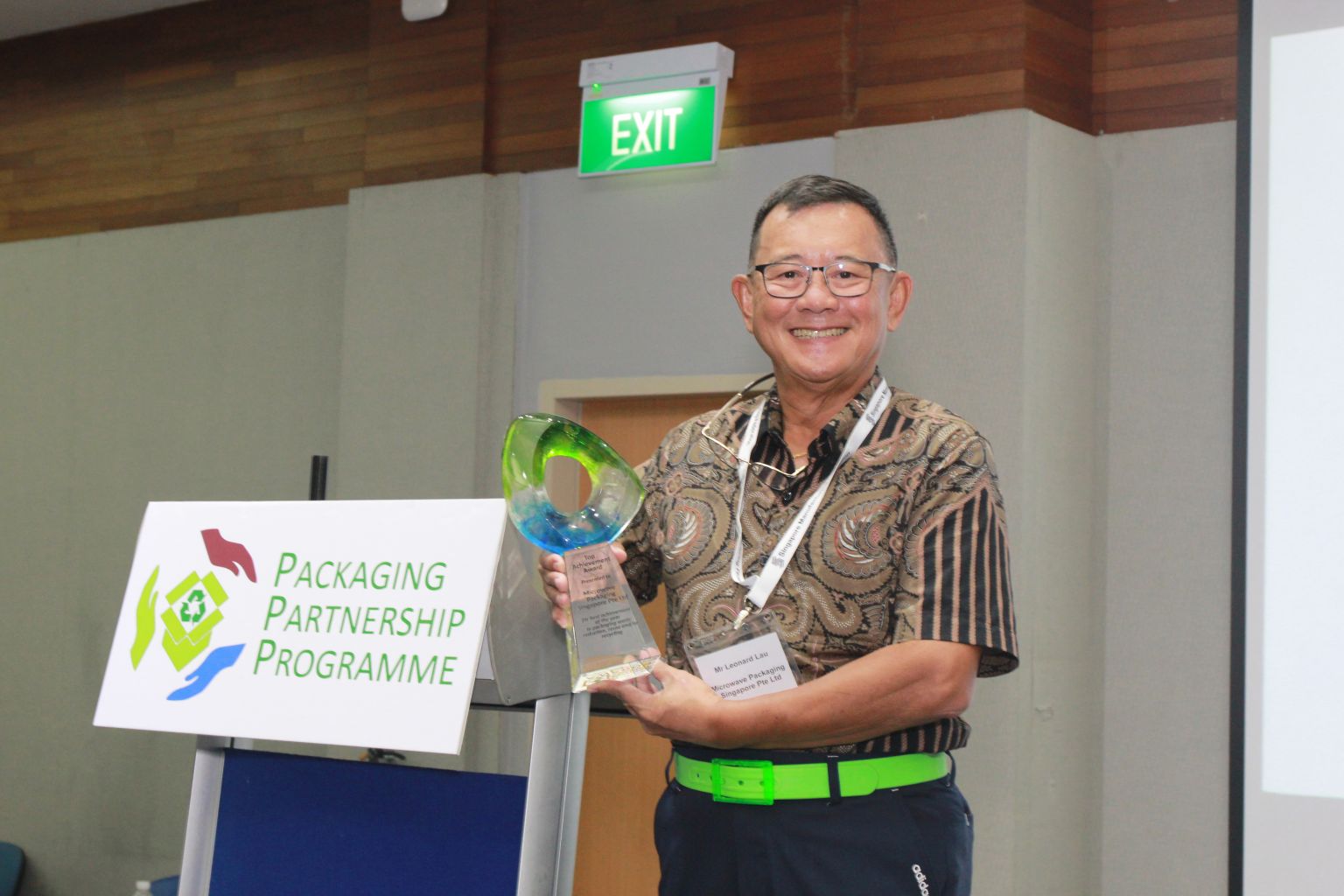15 firms bag awards for reducing packaging waste
Govt to intensify efforts to make suppliers and users ramp up recycling and reusing efforts
Sign up now: Get ST's newsletters delivered to your inbox

Microwave Packaging’s redesign of its paper lunch box – which uses 35 per cent less paper – was a winner at the Singapore Packaging Agreement Awards for 2020 yesterday. The firm’s managing director Leonard Lau (right) said the cost to produce each box has also been halved.
PHOTO: SINGAPORE MANUFACTURING FEDERATION
In an effort to become more resource efficient, Microwave Packaging refreshed its lunch box design, leading to 35 per cent less paper being used.
This has resulted in a reduction of around 70 tonnes of packaging material annually for the manufacturer. The lunch boxes are frequently used to store takeaway food like chicken rice.
Microwave Packaging saw a surge in demand for paper boxes in 2019 as businesses moved away from single-use plastic and styrofoam types, said its managing director Leonard Lau.
This translated to a spike in paper usage from 300 to 1,500 tonnes annually over the past 10 years.
The newer box was also easier to manufacture and production jumped from 1,000 per hour to 6,000.
"Overall, the cost incurred to produce each box has halved," said Mr Lau.
Yesterday, the company clinched the top achievement accolade in the small and medium-sized enterprises (SMEs) segment of the Singapore Packaging Agreement (SPA) Awards for 2020.
The awards recognise the SPA signatories which have undertaken notable efforts and were successful in reducing packaging waste between March 1, 2019 and Feb 29 last year.
A total of 10 multinational companies or large local enterprises, and five SMEs, were recognised for their work in reducing, reusing or recycling packaging waste, and the use of recycled packaging material.
More than 100 signatories were lauded for their attempts to reduce waste.
Launched on June 5, 2007, the SPA by June 30 last year had brought together more than 200 organisations across Singapore. Cumulatively, they have saved around 62,000 tonnes of packaging waste, amounting to $150 million.
Minister for Sustainability and the Environment Grace Fu was a guest of honour at the ceremony at the Singapore Manufacturing Federation (SMF) building.
She said: "Packaging waste is one of the key waste streams we have been focusing on, as it constitutes about one-third of Singapore's domestic waste."
As part of the country's Zero Waste Masterplan, an Extended Producer Responsibility (EPR) framework on packaging waste will be implemented so that manufacturers will be accountable for the collection and treatment of their packaging materials, she added.
A foundational step towards the framework is Mandatory Packaging Reporting (MPR) under which producers of packaged products and retailers, such as supermarkets with an annual turnover of more than $10 million, will be required to collect data and develop plans to reduce, reuse or recycle packaging materials.
The first reports are to be submitted by March 31 next year.
This is aimed at drawing the attention of the companies to the packaging waste they produce and encourage them to actively manage and reduce it, said Ms Fu.
"Beyond this, we will continue to engage the industry and target the broader EPR framework for packaging waste no later than 2025," she added.
The Packaging Partnership Programme was also officially launched at the ceremony yesterday. It is an industry-led initiative by the SMF in partnership with the National Environment Agency.
The initiative aims at developing industry capability in the sustainable management of packaging waste, and helping to raise awareness of the environmental impact of the packaging materials that they supply to the market.
Workshops and training sessions will be organised for members to share best practices in the sustainable management of packaging waste.


